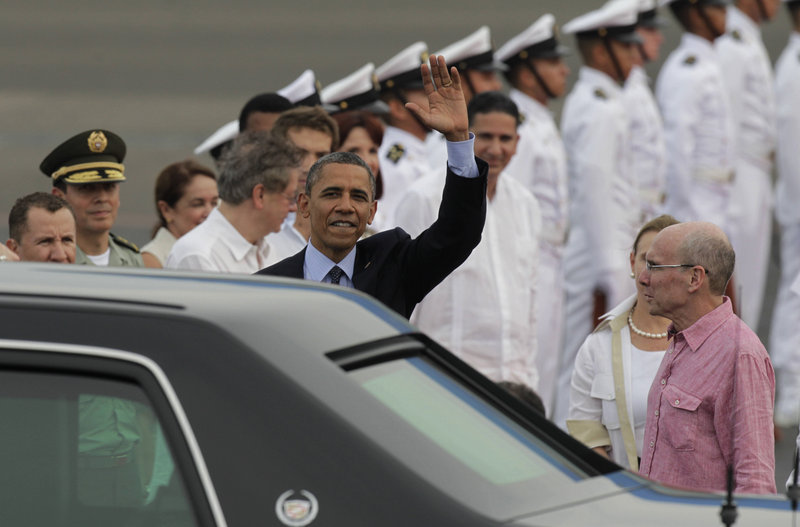CARTAGENA, Colombia – Barack Obama will be on the defensive heading into this weekend’s Summit of the Americas, with the U.S. stubbornly clinging to positions opposed by most Latin American and Caribbean leaders as its influence in the region wanes. The American president, who arrived in this steamy Caribbean port Friday afternoon, can expect even some of Washington’s friendliest allies to protest U.S. insistence on excluding communist Cuba from the gathering.
Vigorous discussion among the 33 leaders is expected on drug legalization, which the Obama administration opposes. And Obama can expect to be in the minority in his opposition to Argentina’s claim to the British-controlled Falkland Islands.
Foreign ministers were wrangling behind closed doors Friday over the insistence by leftist countries that the summit’s final declaration state unequivocally there be no more such gatherings without Cuba.
Obama remains popular in Latin America, but many of his positions are not.
On top of that, key issues Latin American leaders are seeking answers for, such as Cuba, drug trafficking and immigration, may prove to be contentious during a U.S. election year. Although the popular, charismatic Obama may be able to charm the region’s leaders, he will have to convince them that the United States remains relevant to them and their countries.
“I think that the United States has to turn around and really look at Latin America with greater responsibility,” Guatemalan President Otto Perez Molina told The Associated Press in Cartagena Friday. “In reality, I feel that the agenda of the United States and the agenda of Latin America countries, instead of moving in parallel to each other, or converging, are taking paths that separate them, that distance them.”
In large part, declining U.S. influence comes down to waning economic clout, as China gains on the U.S. as a top trading partner throughout the region. In fact, Latin America weathered the recent economic crisis by exporting soybeans, iron ore and other commodities to China.
“Most countries of the region view the United States as less and less relevant to their needs — and with declining capacity to propose and carry out strategies to deal with the issues that most concern them,” the Washington-based think tank Inter-American Dialogue noted in a pre-summit report.
Colombian President Jose Manuel Santos, the summit host, said in a newspaper interview before the gathering that he’s told U.S. officials that it’s foolish not to better engage Latin America.
“What I’ve said and I’ve said it in the United States to a lot of people in government is, ‘You’d better look to the south,’ because their long-term strategic interests are in Latin America, not in distant lands,” Santos said.
Obama can expect a lot of criticism over Cuba’s exclusion, at U.S. insistence, from the summits since the first one in 1994.
Leaders including Santos have said they will permit no more future Summits of the Americas without the communist country’s participation. Ecuadorean President Rafael Correa is boycotting the summit over Cuba’s exclusion.
Another major issue will be drug legalization, which the Obama administration firmly opposes. Santos left the idea off the agenda but has said all scenarios should be explored and the U.N. should consider them.
Send questions/comments to the editors.



Success. Please wait for the page to reload. If the page does not reload within 5 seconds, please refresh the page.
Enter your email and password to access comments.
Hi, to comment on stories you must . This profile is in addition to your subscription and website login.
Already have a commenting profile? .
Invalid username/password.
Please check your email to confirm and complete your registration.
Only subscribers are eligible to post comments. Please subscribe or login first for digital access. Here’s why.
Use the form below to reset your password. When you've submitted your account email, we will send an email with a reset code.